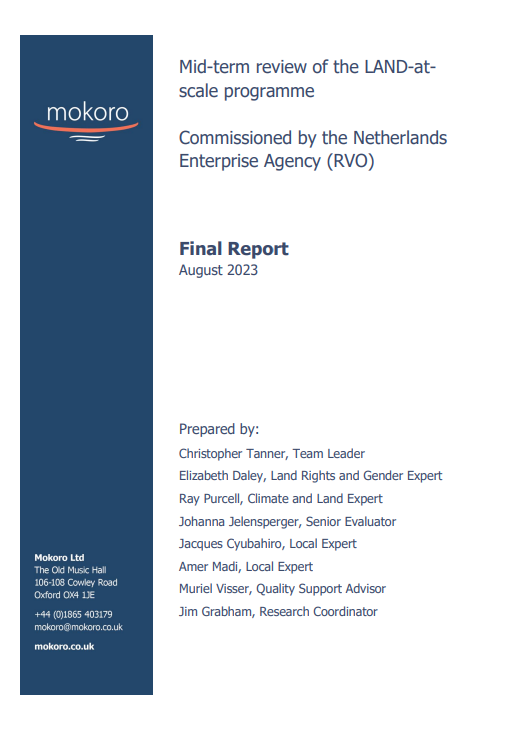Strengthening groundwater governance in Pakistan
Pakistan is highly dependent on irrigated agriculture for employment, income generation and food security—around 90 percent of all food production relies on either surface or groundwater irrigation. The growing dependence of agriculture but also industries and the drinking water sector on groundwater has led to the overexploitation of groundwater resources and, in some areas, to the deterioration of groundwater quality. Fiscal incentives for solarization of irrigation/drinking water pumps are likely to further increase water withdrawals and make water governance more complex.
From promises to action: Analyzing global commitments on food security and diets since 2015
Achieving Sustainable Development Goal 2 (SDG 2), Zero Hunger, by 2030 is in jeopardy due to slowing and unequal economic growth, climate shocks, the COVID-19 pandemic, conflict, lackluster efforts toward investing in food system sustainability and agricultural productivity growth, and persistent barriers to open food trade. Nevertheless, numerous commitments to achieving SDG 2 have been repeatedly expressed by Heads of State and Ministers at diverse global meetings since the SDGs became a focus in 2015.
Terms of Reference: CGIAR Science Group Evaluations
The evaluation function of the Independent Advisory and Evaluation Services (IAES), is executing the 2024 evaluations of the three Science Groups (SGs)—Systems Transformation (ST), Resilient Agrifood Systems (RAFS), and Genetic Innovation (GI). The evaluation Terms of Reference (TORs), which are endorsed by the Strategic Impact, Monitoring, and Evaluation Committee (SIMEC) and build on the Concept Note, are presented to the CGIAR System Council (SC19) as a pre-read.
Presentations for Introducing the new Women’s Empowerment Metric for National Statistical Systems (WEMNS)
The new Women’s Empowerment Metric for National Statistical Systems (WEMNS) is a streamlined tool for measuring women’s empowerment, intended for use in large-scale, multitopic surveys conducted by national statistical systems. WEMNS is designed to measure empowerment in households with all types of livelihoods, in both urban and rural areas, complementing the Women’s Empowerment in Agriculture Index (WEAI), which focuses on agricultural households.
Satellite-based Tracking of Agricultural Adaptation Progress in Sub-Saharan Africa
Lack of systematic tools and approaches for measuring climate change adaptation limits the measurement of progress toward the adaptation goals of the Paris Agreement. To this end, we piloted a new approach, the Biomass Climate Adaptation Index (Biomass CAI), for measuring agricultural adaptation progress in Ethiopia across multiple scales using satellite remote sensing data. The Biomass CAI can monitor agri-biomass productivity associated with adaptation interventions remotely and facilitate more tailored precision adaptation.
Strengthening groundwater governance in Pakistan
Pakistan is highly dependent on irrigated agriculture for employment, income generation and food security—around 90 percent of all food production relies on either surface or groundwater irrigation. The growing dependence of agriculture but also industries and the drinking water sector on groundwater has led to the overexploitation of groundwater resources and, in some areas, to the deterioration of groundwater quality. Fiscal incentives for solarization of irrigation/drinking water pumps are likely to further increase water withdrawals and make water governance more complex.
Mid-term review LAND-at-scale programme
In 2023, the LAND-at-scale programme underwent an external mid-term review carried out by Mokoro Ltd. The report presents the MTR's main objectives, main findings and recommendations.
Planning And Conservation Of Urban Riparian Reserves: Spatiotemporal Evidence From Earth Observation
Context and backgroundAlthough a growing body of literature maintains that riparian reserves are infrequently conserved, a knowledge gap exists on how their status may be assessed through a triangulation of spatial and temporal approaches.Goal and Objectives:This study, therefore, sought to investigate through geospatial analysis the extent to which riparian reserves in Kenya were conserved as provided for under the legislation.
Kenya National Climate Smart Agriculture (CSA) Monitoring and Evaluation Framework. Climate Action Reporting Tool. (CSAT). [Module 3]
The Initiative for Climate Action Transparency (ICAT) project is a collaborative effort between the Alliance of Bioversity International and CIAT, and the Ministry of Agriculture and Livestock Development in Kenya. The project aims to strengthen the capacity of the agriculture sector to implement, monitor, and report adaptation actions in a transparent manner at both national and county levels. To achieve this, the project has developed three training modules that will help to operationalize the CSA reporting tool for the agriculture sector.
Climate Smart Governance Dashboard: technical guide
The Climate-Smart Governance (CSG) Dashboard stands as an innovative platform, providing data on climate-related hazards, vulnerability, climate scenarios, and sector-specific information. Developed as part of the CGIAR initiative on Climate Resilience (ClimBeR), the CSG Dashboard plays a crucial role in supporting nations undertaking the UNFCCC National Adaptation Plan (NAP) process. Aligned with the iterative nature of the NAP process, the CSG Dashboard enhances adaptive capacity and resilience, minimizing vulnerability to climate change impacts.
Early Warning, Early Action and Early Finance (AWARE) Platform: technical guide
The AWARE platform, a vital component of CGIAR's Climate Resilience initiative, stands as a crucial tool connecting early warning systems, proactive measures, and timely financial interventions. Designed for anticipatory action, AWARE empowers stakeholders to mitigate the impact of disasters before they occur, emphasizing multi-level coordination and collaboration for effective responsiveness. AWARE disseminates comprehensive information across climate, market dynamics, health, nutrition, and population displacement.



